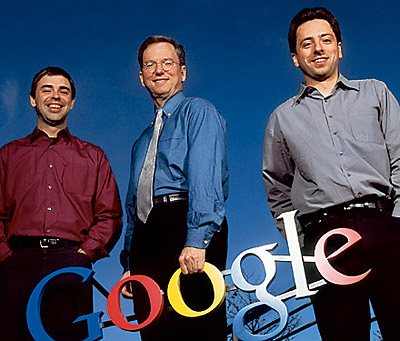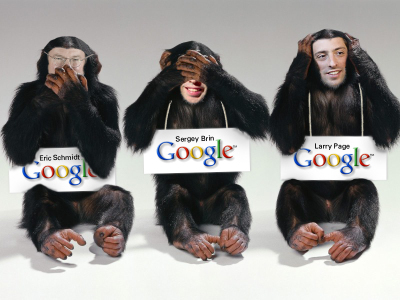GoogleMania
Googled, The End of the World as We Know It, Ken Auletta, 2009
This book, while still worth reading, is a big disappointment. The reader was expecting something akin to the remarkable 1981 The Soul of a New Machine by non engineer Tracy Kidder, that follows Data General as it designs a new generation of minicomputer intended to outperform the offerings of Digital Equipment Corp. This older book is a page turner that uniquely puts the reader into the environment of world class hardware engineers as they race to design the next market beater. I have encountered no other work that has successfully taken you inside this nerdish world.
Auletta focuses more on the technological displacement caused by Google than on the company and its founders and engineers, particularly the displacement experienced by media companies which is really Auletta’s main interest. As a result the two founders Larry Page, and Sergey Brin remain largely unknown beyond what the reader already knows. About their engineering and technology we learn virtually nothing at all. The outside CEO that the venture capitalists forced the founders to hire, Eric Schmidt, is an even bigger enigma. He comes off as a weak indecisive manager with no creativity or imagination and one wonders how he survived this long. His current contribution is to drag Google into “cloud computing” even though it is completely unclear why Google could write or buy suitable enterprise software or would be good at selling or managing this kind of business. Oh, incidentally, Schmidt shares Page’s and Brin’s passion for the Burning Man Festival.

Burning Man
The few facts imparted seem to be these. Larry Page and Sergey Brin met at Stanford and became and remain inseparable. They were both raised in academic families and both attended Montessori schools which encourage independent thought and activity. At Stanford Brin studied data mining, the algorithmic analysis of large amounts of digital data for information. Page was interested in the problem of Internet search and began developing the scan and search algorithms while a student. The first problem is to get the massive resources needed to scan the entire world wide web. The second problem is to somehow prioritize the search hits so that the most relevant results are listed first. We get little insight into either of these problems except some gobbledygook about the number of links to an item giving it weight. After reading this book we don’t know what makes Google the best search engine and this is a big disappointment.

Brin Schmidt Page
Auletta does a little better with the corporate culture captured in the corporate mantra “do no evil”. Somehow, maybe because Google searches are the best, or because their main search page remains totally uncluttered with cute ever changing and timely Google logos, the user has come to trust Google as users never trusted Microsoft. The founders, thus far, have succeeded in putting the user search experience first and any concern with making money second. Despite bad press for their voluntary censorship of their search results in China, Google remains (except for the companies their transformation threatens) a trusted brand and company.

“Do No Evil”
In fact, that Google became a money generating machine is described as almost an accident. Google is engineering driven and they wanted a totally automatic advertising model. What they came up with was an auction where bidders submit a list of keywords and the amount they are willing to pay per click for each word. The winning bid is allowed a short description which will appear in a walled out section of the search result (to make clear that the result is a paid advertisement). The advertiser pays only when the user actually clicks on the link to take them to the advertised page. The result is the money machine, named AdWords.
The second idea came a year later, called AdSense where Google uses a search query to guess what product or service the inquirer might be interested in and displaying, in the walled off section, short advertising blurbs describing the product or service. With AdSense, the result is not directly keyword driven but is driven by assumed inference from the query subject. Neither Adwords nor AdSense which are the only real revenue producers Google has yet conceived are poorly explained and given about 4 pages of the entire book.
In other words we don’t know why Google is the best search engine nor why they are able to generate enormous revenue after reading this book.
Auletta’s discussion of privacy comes down to this; users generally continue to trust that Google won’t misuse the information it collects and every other company in the world is extremely jealous of this information and the uses it could be put to.
Auletta gives considerable attention to the acquisition of YouTube, Google’s so far lack of success in monetizing YouTube, and the copyright problems engendered by user submitted content. Media seem to be slowly coming around to the idea that YouTube can be used to promote their products and lawsuits are abating.
Auletta spends some time on the competitive environment, particularly the almost comic efforts of Microsoft to acquire Yahoo for its reputation and search engine. (For a time when Google was young, Yahoo contracted its searches to Google so clearly even Yahoo recognized that Google has the superior engine). Auletta comments on this protracted odd-couple courtship (Steve Ballmer pursuing Jerry Yang) that the two companies only succeeded in knocking each other unconscious. Microsoft introduced its own search engine, Bing, after this book was completed, but Bing has only achieved about 10% market share and typically is completely entombed in Microsoft stuff like their Explorer 8.
Fearing that Microsoft Explorer will make it difficult to get to Google search, Google has introduced its own browser, Chrome. They would have been better off promoting Mozilla’s open source Firefox but I suspect Google hopes Chrome can become the operating system of cloud computing and wanted a platform that they control. I don’t think many users will use Chrome and Firefox remains very Google friendly.
In perhaps their biggest misstep to date, Google introduced its own open source mobile telephone operating system Android, which they failed to sell to Verizon. (AT&T has a deal with Apple and Iphone). So far, only Tmobile has agreed to experiment with Android. The mistake is that the once close relationship between Google and Apple has soured and Schmidt has been forced to resign from Apple’s board. Having Microsoft (and Yahoo) as enemies is probably inevitable but the Apple rupture should have been avoidable.

Google Earth View of Headquarters
Turning to his favorite subject, mass media, Auletta kind of loses Google because the transformational displacement faced by newspapers, television, radio, cable, and other media would have happened with or without Google. Google just happens to be the capitalization monster and money machine at the center of the Internet transformation. In this section we are really looking at the failures of leadership of these organizations as much as the Internet transformation itself. Corporate consolidation resulted in the corruption of journalism and content and general incompetence. The modern business manager is trained to focus on “efficiency” rather than opportunity and growth with the result that they manage their companies into non existence. Google didn’t destroy these companies, they self destructed in the face of an inevitable technical transformation. I wish this section hadn’t been put into a book purporting to be about Google. The best part of this section is a quote from NYU professor Clay Shirky (written for his blog of course) concerning the fate of newspapers:
The old stuff gets broken faster than the new stuff is put in its place. The importance of any given experiment isn’t apparent at the moment…When someone demands to know how we are going to replace newspapers, they are really demanding to be told that we are not living through a revolution…They are demanding to be told that the ancient social bargains aren’t in peril, that core institutions will be spared, that new methods of spreading information will improve previous practice rather than upending it. They are demanding to be lied to…We’re collectively living through 1500 (advent of the printing press), when its easier to see what’s broken than what will replace it…Society doesn’t need newspapers. What we need is journalism.
Maybe someday someone will write the real inside story of Google. This isn’t it.
This reader’s personal experience with search engines is more compelling than this book. As a software engineer, I was very dependent on being able to find very specific (and often obscure) information on the Internet. Every time a new search engine was introduced, I jumped to try it immediately, hoping that the frustration of finding what I needed would be lessened. When Google first appeared, in 1998-9, I tried it and never left. I have not tried Bing once. During the time I was developing Windows software for Ticketmaster, I was completely dependent on Google to find detailed technical information from Microsoft’s own Developers Network. If I used Microsoft’s own search from within their network I could never find anything. Google could find the most obscure information like how to create a dynamically scalable table in which rows and columns can be dynamically removed. Without Google search, I never would have found the right references and articles.